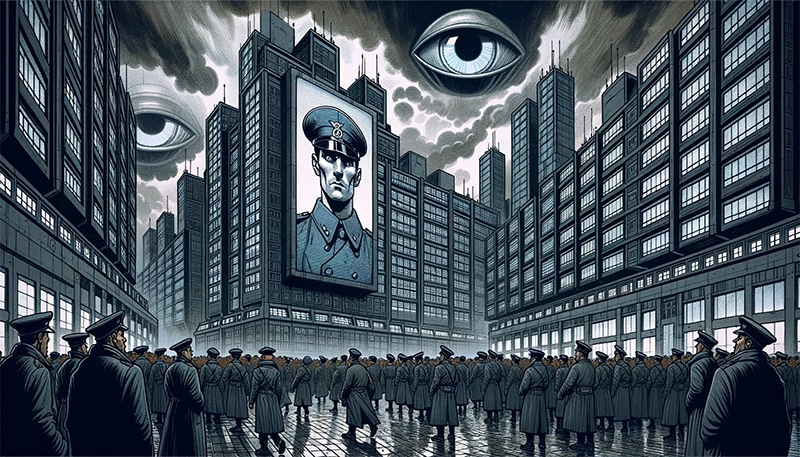1-Minute Short Summary of 1984 by George Orwell (Plot Overview)
George Orwell’s 1984 depicts a fictional dystopian realm that is eerily reflective of some modern-day societies. Want a brief rundown of the book’s anti-totalitarianism plot? Here it is.
For more quick and easy book summaries, check out our hub.
Short Summary of 1984
1984 opens in a grim London as the clocks strike thirteen. Winston Smith, a bureaucrat ensnared in the oppressive machinery of the Party, lives in a world where every action, word, and thought is scrutinized by the omnipresent eyes of Big Brother. The Party enforces loyalty and love for Big Brother through fear, manipulation, and control.
Winston, who works at the Ministry of Truth, is responsible for altering historical records to match the Party’s shifting narratives. Despite his façade of obedience, Winston harbors rebellious thoughts which are a perilous offense in a society where even a facial twitch can betray subversion.

As Winston’s disillusionment grows, he begins a forbidden love affair with Julia, a coworker who shares his contempt for the Party. Their relationship is an act of rebellion as it defies the Party’s ban on free love and loyalty to anything other than the state. They rent a room above an antique shop for their trysts, a seeming haven from the watchful eyes of the Party.
Their illusion of sanctuary shatters when they are betrayed by the shop owner, a secret agent of the Thought Police. The couple is arrested and separated. Winston is taken to the Ministry of Love, where he is detained, tortured, and re-educated. The Party’s aim is not merely to punish, but to break and reshape thoughts and allegiances.
In the novel’s climax, Winston is broken by the threat of being consumed by rats, his deepest fear, in Room 101. His final act of betrayal is begging for Julia to suffer in his place, thus demonstrating the Party’s power to crush the human spirit.
Ultimately, Winston is released back into society, a shell of a man who has accepted the Party’s dominion in all things. He meets Julia one last time, and they admit to betraying each other. The novel closes with Winston, sitting alone in a café as the victory of the Party is announced. He reflects on his newfound love for Big Brother, the acceptance of which signifies his complete and utter subjugation to the Party’s ideology and control.
Check out our list of thrilling dystopian novels.
Key Themes
- Totalitarianism and Oppression: The novel portrays the extreme authoritarian abuse of power, where the state controls every aspect of life and personal freedom is non-existent.
- Surveillance and Privacy: 1984 scrutinizes the invasive monitoring of individuals by the government, questioning the boundaries between public order and personal liberty.
- Reality Control and Propaganda: It explores how a government can manipulate reality through propaganda, controlling the population’s perception of truth.
- Individualism vs. Collectivism: The book contrasts the importance of individual thought and identity against the demands of a collective society.
- Language as Mind Control: Orwell introduces the concept of Newspeak, a language designed to diminish the range of thought, illustrating how language can be used to control thought and behavior.
- The Betrayal of Trust: The book delves into how extreme regimes destroy trust between individuals, using betrayal as a tool for control.
Book Trivia
- Orwell’s Inspiration: The concept and the grim political warning of 1984 were largely inspired by Orwell’s experiences during the Spanish Civil War and the rise of totalitarian regimes in Russia and Germany.
- Orwell’s Health: Orwell wrote 1984 while battling tuberculosis, and the bleakness of the novel may reflect his own suffering and deteriorating health.
- The Title: The title 1984 was chosen as a reversal of the last two digits of the year it was written, 1948, although it is often mistaken as a prediction of the future.
- Big Brother: The phrase “Big Brother is watching you” has transcended the novel and entered the lexicon as a synonym for the abuse of government power, particularly in respect to civil liberties, often related to mass surveillance.
- Newspeak: Many terms from the novel’s language, Newspeak, such as “doublethink” and “thoughtcrime,” have also become common in discussions of privacy and security in the age of technology.
✅ Worth checking out!
- 1984: 2 (Essential Orwell Classics)
- George Orwell (Author)
- English (Publication Language)
This post contains Amazon affiliate links. Please read our privacy policy for more.

